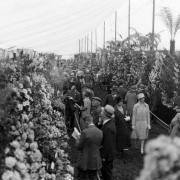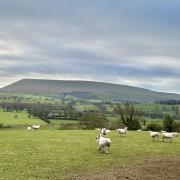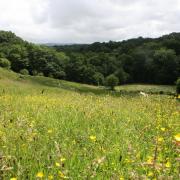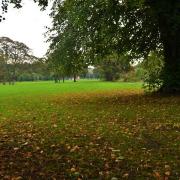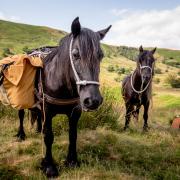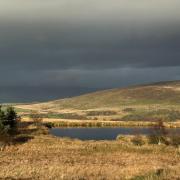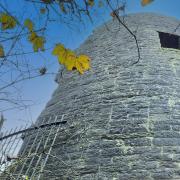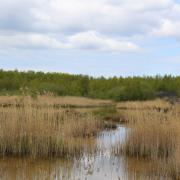Former Corrie actor Deborah McAndrew on writing “An August Bank Holiday Lark” for the Northern Broadsides Theatre Company.
2014 marks the 100 year anniversary since the beginning of the First World War. All over the country events will signal the commemorations of this day as we remember those who fell.
Deborah McAndrew’s new play, “An August Bank Holiday Lark” is a play written particularly about the war, but also celebrates a very special event still celebrated to this day in Saddleworth.
Deborah is no stranger to acting. In the early 90’s she portrayed the role of Angie Freeman in Coronation Street. The move into writing is not a new one, but more of a full circle process.
Deborah began her career studying drama as opposed to going to a drama school. The accreditations were different back then and people were unable to get degrees
in acting. From university Deborah trained to be a teacher and had a job singing with a band, but always lacked the confidence to be a writer. Not only was she unsure what to write about she was worried about who would want to read what a 21 year old had to say. It was around this time when she got the role on Coronation Street up until the late 1990’s. At the turn of the century, after the birth of her daughter, she turned down a lot of acting roles to concentrate more on her writing.
Her focus nowadays is more on her writing even though she still sees the similarities between that and acting. “The processes are similar in the fact that you are imagining you are someone else. The difference is as an actor you are always waiting for a job, whereas a writer can always write. Everything written provides more knowledge and you are always learning.” She finds there is a lot more autonomy as a writer with freedom to control the characters how you wish and create your own story and finds the whole process a pleasant experience. Deborah also teaches playwriting at university which she finds helpful in terms of the reflection of her own work and having to articulate what you are doing by actually talking about it and reading other people’s work giving your own thoughts on a piece. As Deborah says, “If you really want to understand something, teach it.”
Northern Broadsides was formed in 1992 by Artistic Director Barrie Rutter. They are a multi-award winning touring company based in the historic Dean Clough Mill in Halifax, West Yorkshire. Deborah has been involved with the company for the past twenty years, firstly by acting with them and then more recently by writing plays for them. She has written five plays for the company, three of which were adaptations and two of which are new pieces. Her latest work is “An August Bank Holiday Lark”
The idea for the play came from Artistic Director of Northern Broadsides, Barrie Rutter, who approached Deborah to write a play for the 100 year anniversary of the start of the First World War. The brief that she received from him was very simple. The play had to be about the First World War. It had to be called “An August Bank Holiday Lark” (a line from the poem “1914” by Phillip Larkin) and it had to be about folk dancing!
Then began the arduous, but rewarding task of research. As Deborah declares, she loves uncovering things and joining them up. The title of August Bank Holiday was where the main part of the story would play which aided in the research process as the action had to be centred around this time. Deborah spent time firstly in London to the Cecil Sharp House which is the home of the English Folk Dance and Song society. But, it was during the research that she uncovered the Rushcart ceremony and her attention was drawn Northwards to Saddleworth.
The Rushcart ceremony is where Parishioners would parade around the parish once a year bearing rushes. This would end at the Parish church where the rushes were laid on the floor of the church to replace the worn out rushes. The ceremony incorporated music and dancing and was revived in 1975 by the Saddleworth Morris Men and will soon be celebrating the 40th year anniversary.
Deborah’s travels also took her to Helmshaw Mill Museum to try and find an ideal setting for the play and also to the Fulwood Barracks in Preston to learn about the different regiments that were at war. She felt that she needed a real life narrative to match a functioning fictional. During her time in Fulwood she learnt a great deal about the 6th battalion of the Loyal North Lancashire Regiment and it was this regiment which was used to base the characters on.
All that was remaining was a time and location and as she wanted to tell the story of the war from a central location, a mill village in this instance, but for the war to be taking place elsewhere. It was during the research period she exposed an untold story about The Lancashire regiments that were on the Eastern Front and there were quite a lot of them based in Gallipoli. This was where the August defensive of 1915 played a major part in trying to gain control and fitted in perfectly with the context and brief of the story.
She wanted the play to focus primarily on the war and the effect it has on families and communities. How men went away to fight and some never returned. How the men that did return found their lives changed forever and how the women had to deal with loss and to live with the shadows of their former husbands brought back to them, but with the addition of trauma caused by war. Dealing with a subject such as this is always going to have a sad theme, so the inclusion of the vibrancy of the Rushcart and the songs and dancing that accompany it will give it that perfect balance.
A community is no small place, so the cast had to be large especially as there are usually eight men within a dance troupe. The experience of writing for such a large cast - considering it is a new play - was a challenge to Deborah, but ultimately rewarding. “Constraints are brilliant because they help you work out what you are doing.”
Deborah is one of the first British female dramatists to write a play about the First World War. The detailed synopsis and dedication to her research is proof of her abilities and passion to write a truly moving story representing the theme of the War in a thought provoking story. Her emotions may be a mixture of nerves and excitement during the opening performances of the show, but based on the conversation that we had and the aspiration she has for her work I believe we will be witness to something truly special and memorable.
“An August Bank Holiday Lark” starts its nationwide tour on February 7th. Go to www.northern-broadsides.co.uk for dates and ticket info
@robgemmell1




